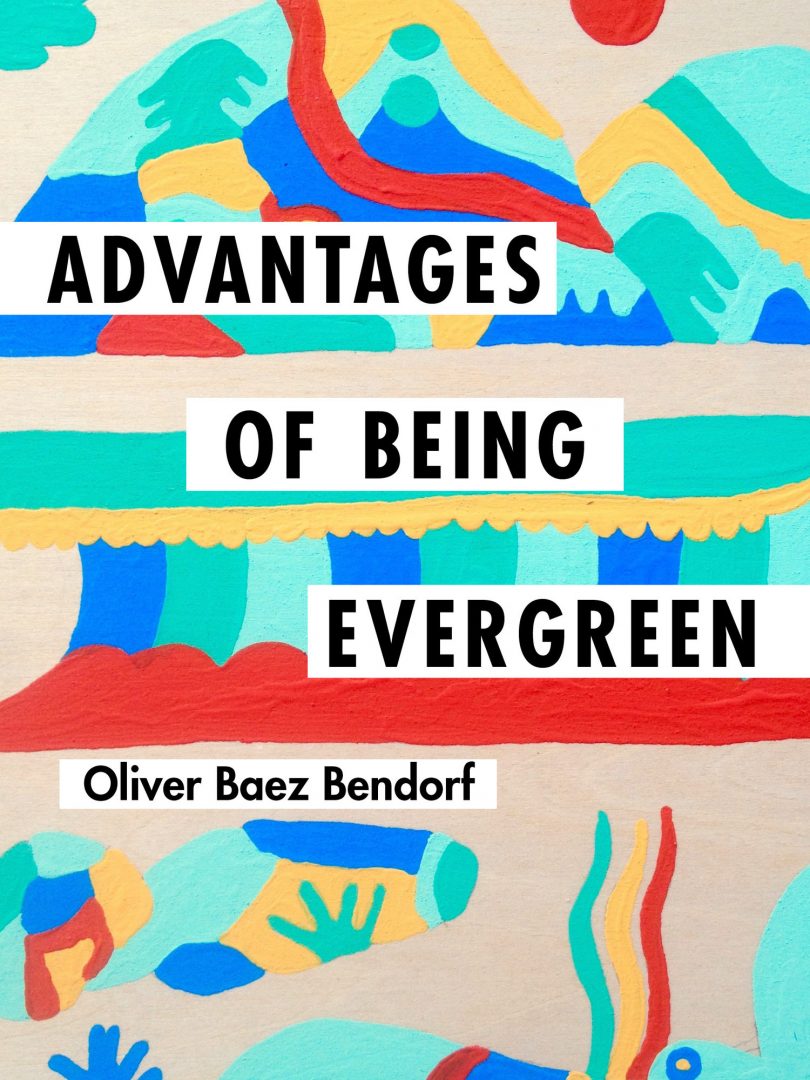‘The Advantages of Being Evergreen’ by Oliver Baez Bendorf

Author: Jennifer Natalya Fink
November 6, 2019
There has never been a man
but there must now be a man, not because one is needed but because one isn’t.
There must be a ghost. They must be hungry.—“Field Guide,” Advantages of Being Evergreen
Who are we, and who were we? How do our past selves collide with our present lives? As our bodies and genders transform, age, learn, how are we haunted by our previous personas? In language by turns playful and painful, Oliver Baez Bendorf examines the complex nexus of feelings that we all experience in encountering our past selves. He frames that encounter in the particularities of trans experience: in the ways a previous, ill-fitting gender ghosts one’s present body. “Somedays I re-/member the girl out of me,” Bendorf declares in “Long Shot With A Girl Who Is Also Me,” only to interrogate this claim later in the poem: “Why can’t I remember the girl out of me?” And in “Elegy,” he marks the intimacy and distance from this gender, this youth, in all its trans specificity and universality: “far/from the girl/I was/I left because everyone did.” In so doing, Bendorf opens up the question of what a body can be, and for what it hungers.
In this slim but startlingly powerful collection, the natural world—and a specifically rural, North American one at that—is often the site of these encounters. The danger the ‘natural’ world (inhabited so often by homophobes) poses for queers is marked, as well its liberatory, generative qualities. In “Queer in the Almost-South, Bloomington Community Orchard, Indiana” a moment ripe with potential violence and freedom is marked, stalled, suspended: “van squeaked/as it turned/off the road/[….]the van meant/trouble/[….]feeling watched/from where?/god, maybe/pileated woodpecker maybe—” Dashes, negative spaces, and neologistic word play enact a wild queer reimagining of the potential of language to redress our past oppression and imagine new possibilities for gender, nature, and ecstasy. Queer, joyful nature and the joyful nature of queerness are at the center of these vivid, layered, heartfelt explorations of how we inhabit, challenge, remake, and revisit our bodies and the worlds in which they are conceived.
What language have we inherited to describe these experiences, how shall we remake it to fit our reimagined bodies, genders, lives? The necessity of using the language we’ve inherited is marked: “because we’ve known/ourselves as throwaways/already,/ we do not dispose” (“After A While, We Stop Asking”). Hence daddies, witches, beards roam between poems and bodies, constellations newly imagined made of our ecstatic queer desire. Intimacy with an unnamed ‘you’, who slides into the reader, is figured as always not quite in one’s grasp, while a ‘we’, generalized to include all of us queers, is invoked in poems such as “We Congregate,” a two-liner that reads like a Zen koan-slash-fortune cookie-slash prayer: “sons of beaches, glitter tongues, sister hoods, hermanos,/faggots, wolverines—everything under the moon.” Bendorf writes in the queer tradition of Frank O’Hara’s charming homoeroticizing of the everyday, John Ashberry’s subtle movements from concrete image to abstract musings, and Eileen Myles’ capacious making and unmaking of gender. But Bendorf is startlingly original in the way he bends language to explore how the trans body—and all queer bodies—reencounter previous selves embedded in the landscape, in “nature,” insisting on the spirit of all made things.
Bendorf’s writing is both complex and accessible, relying on easily apprehended queering of language and more subtle formal movements such as enjambment and elision to create its resonant, vivid effects. In “Breath I” and “Breath I, I,” words congregate in lines organized almost alphabetically. The “almost” matters here: where the alphabetizing is broken, meaning surges in: “Fuck full function ghost/grows haunted held hold.” Such wordplay saturates Bendorf’s poems, suggesting the abundance of queer possibility inherent in trans and queer lives. Instead of the familiar narrative of the trans path from deficit to certainty, Bendorf offers an exploration of the ecstatic abundance, the surfeit of meaning and possibility, the complex advantages of being evergreen. Wistful yet hopeful, these poems invite us to imagine this dangerous world as loving our bothness, our transitions, our travels forward and backwards in time, bodies, love.
I wish for
all of us
bearded monsters
to know
we can be
soft too, loved too.—“This Multitude We’ve Become,” Advantages of Being Evergreen
Advantages of Being Evergreen (Winner of the 2018 CSU Poetry Center Open Book Competition)
By Oliver Baez Bendorf
Cleveland State University Poetry Center.
Paperback, 9781880834008, 70 pp.
September 2019

